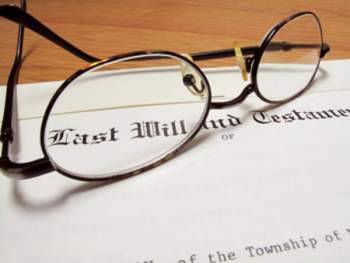
Read This before Writing the Will

Must Read
Those unfamiliar with the concept of creating and probating a will may assume that this process is a straightforward, short-term endeavor. On the contrary, when one or more parties named in a "Last Will and Testament" has reason to challenge the veracity of its terms, the probate process may take significantly longer. Potentially, a year later and after considerable legal fees spent, matters of certifying this document may still not be finished, and what's more, this may cause a strain on the intrafamily relationships. In general, good planning and detail are usually the best policy when it comes to drafting a will. Some family members may be reticent to want to discuss these affairs given what is implied, but the consequences could be grave if they do not.
Background
A Last Will and Testament is a legal document that specifies how a person's estate will be distributed upon his or her death. The history of wills dates back to the Ancient Greeks and Romans when the Greek lawmaker Solon began allowing people to dictate who would have control of their property once they died, with some similarities to today's process of creating last wills. Wills in ancient times were also required to be written documents signed by the creator as well as witnesses. In England, a feudal system existed that governed the way in which land was distributed, which led to the distinction between real and personal property. A Statute of Wills was passed in England in 1540 that specified the requirements for passing on property to heirs. In this time, there were restrictions placed on testators requiring them to be men of sound mind. This lengthy history forms the basis for modern estate planning.
Purposes
The purpose for writing a last will is to dictate how the deceased's estate will be managed after his or her death. This document names specific parties who will be responsible for distributing the estate as well as who will have possession of real and personal property after the testator's death. A person is no longer able to dictate what will happen to his or her property after death, which is why it is important to have a last will. It ensures that property will not fall into the wrong hands or be transferred back to the government. Most people create a last will with the aid of an attorney. This will make certain that a last will is valid when it goes to probate court and has less of a chance of being contested. When constructing a last will it is encouraged that people list all important assets as well as any debts they may have.
Requirements for Formation
The major requirements for writing a will deal with the testator's age and state of mind. In most states, the legally required age is 18. Testators must be of sound mind, which means they must possess the mental capacity to understand the value of their property, as well as make decisions about who will become their beneficiaries and executors. There must be evidence that a testator was not coerced or under duress at the time of the document's creation. The testator must clearly identify the fact that the document will serve as his or her Last Will and Testament and be signed by the the testator and several witnesses. The witnesses of the will must not be named as a beneficiary or executor, or the document may be rendered invalid. Testators must also make it clear that this current document supersedes all other previous wills or codicils. It is not a requirement that the drafting of a last will be overseen by an attorney, but this is often beneficial to the testator to ensure that the will is not fraudulent.
Parties in a Will
The key parties involved in the creation of a will are the beneficiary, the executor, and the testator. The testator is the person whose will is being created and the person whose signature appears at the end of the document. Testatrix is a term sometimes used that refers to a female testator. Beneficiary refers to the person or persons that will receive a portion of the testator's estate. A testator may choose anyone he wishes to be a beneficiary; common choices are a spouse, child, family member, or close friend. Sometimes a beneficiary may be an organization, such as a church or university. The appointed executor becomes the administrator of the testator's estate. This person is responsible for paying off debts and taxes, closing all accounts, and distributing property and other assets to beneficiaries. An executor holds an important responsibility and must be reasonably fit for the position.
Will Execution
An executor of a will manages the testator's estate upon this person's death. Most testators name their lawyer, accountant, or a close, trusted family member as executor. The executor is responsible for offering the will at probate court. This person's duties include: obtaining a copy of the death certificate and original last will, closing out bank accounts, credit cards and subscriptions, contacting banks to have funds transferred into the estate, paying off all debts and taxes, obtaining money from any existing life insurance policies, and distributing property and other gifts to the named beneficiaries. An executor may also be in charge of funeral arrangements and carrying out all other requests the testator has made in his or her last will.
Will Contests
A will contest may be raised by either a person who is named in the deceased's last will or a person that is not named who feels that he or she should benefit from the deceased's estate. The people contesting the will must have reasonable grounds to do so. They may claim that the testator was not of sound mind when the document was created or that this person was under undue pressure from a third party. Testamentary capacity refers to the mental capacity of the testator and is often challenged in will contests. The burden of proof is on the person contesting to show evidence that the testator was not reasonably able to make coherent decisions about the allocation of property. Claims of fraud are also common in will contests and even though a will may contain a no-contest clause, this can still be an issue during probate.
Will Codicils
A will codicil is an amendment to a testator's Last Will and Testament. It is not meant to entirely replace the will, but to make some change to a section of the existing document. A codicil to a will is held to many of the same restrictions as a last will. It must be signed by the testator, who, again, is of sound mind, and signed by witnesses who are not mentioned as beneficiaries within the document. The codicil is usually attached to the last will to avoid confusion in probate court as to whether the document is serving as a last will or an amendment. A codicil not witnessed may be valid in certain jurisdictions if it can be proven that the document expresses the true intentions of the testator. People may choose to create a codicil rather than an entirely new Last Will and Testament to reduce cost; however, due to the integration of word processors in the legal system, it can be just as easy to create an entirely new last will.
Holographic Wills
Some jurisdictions may accept wills that are handwritten without the signatures of witnesses, called holographic wills. These wills are usually accepted in emergency situations and are held to certain minimal requirements. It must be proven, based on the testimony of a handwriting expert or a present witness, that the document reflects the true intentions of the deceased. It will be assumed that the testator was of sound mind at the time of creation unless there is clear evidence to refute this. Holographic wills are often created when a person is near death and has limited means to create a traditional Last Will and Testament.
Disinheritance
Normally, a deceased's estate is distributed among his spouse and children. In some cases, though, a testator may chose to disinherit a family member. This means that the individual will be purposely excluded from the will and receive no portion of the deceased's estate. Usually, it is necessary to include specific language within the document to make this fact clear. Sometimes, if the language is not specific, this disinherited person can still receive a share by contesting the will in probate court. A family member may be disinherited for many different reasons, which are not generally stated within the last will. In all states besides Louisiana, a parent is legally able to disinherit a child as long the will makes some other provisions for the allocation of property. If parents feel that their child is untrustworthy, but do not want to fully disinherit the child, they may establish a trust as a alternative.
Community Property
Community property refers to assets purchased during a marriage and owned jointly by husband and wife, different from separate property that is owned solely by one of the spouses. It is important to make this distinction within a Last Will and Testament so that all property a spouse wishes to keep separate is not inherited by the surviving spouse. There are nine U.S. states that are considered community property states. Under these jurisdictions, if a property owner dies without a last will, the spouse is entitled to inherit the jointly-owned property in the estate. In some cases, within community property states, even if the surviving spouse is disinherited, he or she will still be entitled to the jointly-owned property. In non-community property states, meanwhile, property is divided by equitable distribution, which is considerably more common than community property distribution.
Intestacy
When a person dies without having created a valid Last Will and Testament, his or her estate is referred to as intestate. In other words, after paying off all debts and taxes owed by the deceased, there is still a portion of the estate that is unaccounted for. In this case, the state will divide this property based on a system of heirs. Intestacy legislature specifies which family members will be entitled to receive a portion of the estate. It is usually awarded to the surviving spouse and/or parents of the deceased. If these parties are no longer living then the estate will be divided among other close family members. If the deceased is not survived by a spouse or any blood relatives, then the property may be transferred back to the state.
Probate Law
Probate is a legal process in which the courts determine the validity of a testator's will as well as distribute the deceased's property to the proper beneficiaries. This process includes transferring property from the deceased's name into the name of the beneficiary and paying off all taxes and debts owed by the deceased. This is also when a will may be contested. If the deceased leaves behind a clear Last Will and Testament and there is no contests or lawsuits against the estate, then the probate process can be very short. However, there are often complicated issues that arise during this process, and it can prove to be very lengthy. If the deceased leaves behind no assets, then the process of probate is not necessary. A probate lawyer may be appointed to aid executors in understanding the technicalities of probate law.


















